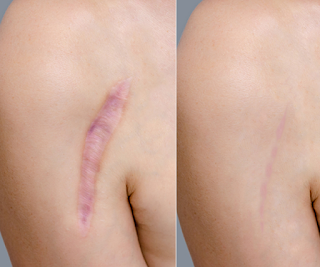Understanding Acne Scars Explore Different Types and Causes ?
Acne is a common skin condition that affects millions of people worldwide. While the presence of acne itself can be frustrating, it is often the resulting scars that can have a lasting impact on an individual's self-esteem. Understanding the different types and causes of acne scars is crucial in developing effective treatment strategies. In this article, we will delve into the world of acne scars, exploring their various types and the factors that contribute to their formation.
Acne Scar Treatment in Hyderabad
Types of Acne Scars:
Atrophic Scars: These scars appear as depressions in the skin and are the most common type of acne scars. They can be further classified into:
a. Ice Pick Scars: Deep, narrow scars that resemble puncture marks.
b. Boxcar Scars: Broad, shallow depressions with well-defined edges.
c. Rolling Scars: Wave-like or undulating depressions that give the skin a rolling appearance.
Hypertrophic and Keloid Scars: Unlike atrophic scars, these scars are raised and result from excess collagen production during the healing process.
II. Causes of Acne Scars:
Inflammatory Acne: Acne lesions that are inflamed and deep, such as nodules and cysts, are more likely to lead to scarring.
Delayed or Inadequate Treatment: Failing to treat acne promptly or using ineffective treatment methods can increase the risk of scarring.
Picking or Squeezing: Picking at acne lesions or attempting to extract them manually can rupture the skin and worsen scarring.
Genetic Predisposition: Some individuals may be genetically more prone to developing severe acne scars.
Skin Type and Healing Capacity: Factors such as skin type, pigmentation, and the body's healing response can influence scar formation.
III. Treatment Options for Acne Scars:
Topical Treatments: Certain creams, gels, and serums containing ingredients like retinoids, alpha hydroxy acids, or silicone can improve the appearance of acne scars.
Chemical Peels: A controlled chemical solution is applied to the skin, exfoliating the top layers and promoting collagen production, thus reducing the appearance of scars.
Microneedling: Tiny needles create controlled micro-injuries, stimulating collagen production and remodeling the skin.
Laser and Light Therapies: Various laser and light-based treatments can target specific types of acne scars and promote skin rejuvenation.
Dermal Fillers: Injectable fillers can temporarily plump depressed scars and create a smoother skin surface.
Surgical Procedures: In severe cases, surgical interventions like punch excision, subcision, or dermabrasion may be considered to treat deep scars.
IV. Prevention and Self-Care:
Early and Effective Acne Management: Timely treatment of acne can help prevent severe inflammation and subsequent scarring.
Gentle Skin Care: Adopting a gentle cleansing routine and avoiding harsh products can minimize skin irritation and potential scarring.
Sun Protection: Regular use of sunscreen can protect the skin from harmful UV rays, which can worsen the appearance of acne scars.
Hands-Off Approach: Resist the temptation to pick, squeeze, or pop acne lesions, as this can lead to further scarring.
Conclusion:
Acne scars can be a distressing aftermath of acne, but with the right knowledge and treatment approach, their appearance can be significantly improved. By understanding the different types of scars and addressing the underlying causes, individuals can explore suitable treatment options and embark on a journey towards smoother, clearer skin. Remember, consulting with a dermatologist or skincare professional is essential to determine the most appropriate treatment plan for your specific acne scars.



Comments
Post a Comment